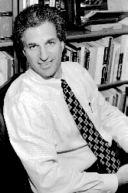|
|
Meeting Counseling's Changing RolesNew chair: Mark Ginsberg wants to deliver mental health services to non-traditional settings
Christina A. Rowett |

Mark Ginsberg would like to see the social stigma of mental health counseling erased. He would also like to see counseling readily available to everyone who needs it.
To that end, the new chair of the Department of Counseling and Human Services in the Division of Education at the School of Continuing Studies is doing his part to prepare counseling professionals to work in a variety of non-traditional settings.

Mark Ginsberg, the new chair of the Department of Counseling and Human Services in SCS's Division of Education, sees a future with increased counseling being done in organizational settings. |
"One of the ways to make counseling services more accessible while challenging the stigma of seeking these services is to broaden the kinds of settings where practitioners practice," Ginsberg said last week in his office on the Homewood campus. "It's not just practicing in mental health and human services facilities; it's bringing these kinds of technologies to settings that historically may not have offered them."
Two of the prime examples are schools and workplaces. And as the locations of counselors change, Ginsberg said, the roles of counseling professionals change. The programs offered by SCS reflect that.
All the department's training is on a graduate level. Most of the 450 students have had training in the behavioral sciences; some have returned to the classroom to enhance their training. The school also offers certificate programs for students who already have graduate degrees.
In the past, Ginsberg said, school counselors may have been former teachers looking to change their role in the school, so they often handled student scheduling and tasks such as detention and study hall.
"So if you were a student, you would meet with your counselor once a year and figure out what to take the next year," he said. "Then when you were a senior, you'd go and talk about colleges."
Those functions are still important, Ginsberg said, but the responsibilities of school counselors have increased. In addition to offering career and scheduling advice, the current breed of counselors focuses on behavioral issues and the social and emotional needs of students. In short, they are given more responsibility for the development of students.
"One of the trends is for schools to be more full-ranging human service centers," Ginsberg said, "so the school is really the cornerstone of the community, working not only on educational issues but on issues concerning the overall development of the student and his or her family."
One specialized master's-level program of the department, offered in partnership with the Baltimore City public schools, is designed to train school counselors in urban settings. Faculty also are working with Baltimore County school counselors to offer training on how to be more proficient with students who are at risk.
"Increasingly, I think that what we'll see in the future is more collaboration between counseling professionals, classroom teachers, special educators and others," Ginsberg said. "A multidiscip-linary team of professions may be better positioned to deal with some of the complicated behavioral challenges that kids face."
Counselors are also finding more jobs in workplace settings, where employers are offering a variety of mental health, human services and other related enrichment programs.
"Employees are often troubled by a range of issues," Ginsberg said. "Employee assistance programs are evolving and providing a broader array of services. In the future, it will take a more specialized set of skills to work in that unique kind of setting."
Ginsberg is no stranger to promoting mental health in the workplace. From 1993 until joining SCS late last year, he was the director of the Hopkins Faculty and Staff Assistance Program, which offers referrals, counseling and crisis intervention services to employees and their families.
"What we've come to understand in organizations and workplaces is that when individuals are troubled, those difficulties can affect and be related to other individuals in the unit and the unit as a whole," Gins-berg said. "What we're trying to do is cross-train people to provide services directly to individuals and to be trained in the field of organizational behavior and development."
FASAP is a perfect example of that approach, Ginsberg said, and it is also where he witnessed firsthand the far-reaching benefits of "organizational counseling." One of the most significant changes in the profession, he said, will most likely be counseling done in organizational settings. It is a method of considering not only individuals but their family, their community and their organization when offering counseling.
"The field of counseling is evolving at a very rapid rate," Ginsberg said. "What we're trying to do in the department is to think about the traditional roles and settings for counselors and some of the innovative and alternative roles they will be assuming over the next decade."
Two new post-master's certificate programs will begin in fall 1998. One will prepare counselors to work as specialists in the evolving field of organizational counseling; the other will focus on career counseling. The department already offers post-master's training in addiction counseling and working with youth who are at risk.
Ginsberg, who officially began as chair of the department Sept. 1, 1997, is also on the faculty in the departments of Psychiatry and Behavioral Sciences and Medicine in the School of Medicine and continues to practice clinically on a limited basis.
"I think it's important to maintain being a practitioner and being an administrator," he said. "It's important not to lose part of my identity and for me to have opportunities to continue to grow and learn, which helps me to remain connected to the day-to-day challenges that our students and graduates will face."
| GO TO FEBRUARY 2, 1998 TABLE OF CONTENTS. |
| GO TO THE GAZETTE HOMEPAGE. |